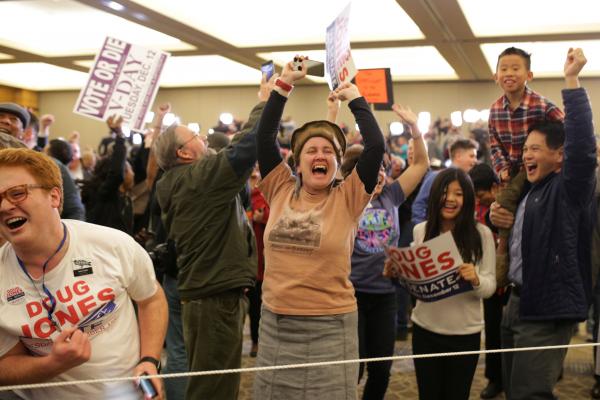"I wanted you to see what real courage is, instead of getting the idea that courage is a man with a gun in his hand. It's when you know you're licked before you begin but you begin anyway and you see it through no matter what. You rarely win, but sometimes you do.” Harper Lee, To Kill a Mockingbird
I’m a student at Auburn University, a conservative college deep in red-state Alabama. During the Moore-Jones race, and after Jones’ historic win, I spoke with several Auburn women, current students and alumni, about their experiences.
These women — an aspiring healthcare lawyer and woman of color, a progressive Alabama native, a future minister, a Detroit native, a Muslim woman of color, a pro-life Christian, a college-age sexual assault survivor, a queer student from a conservative family, and a first grade teacher — give voice to what happened in the Alabama Senate race. And they give clues about what the state's political energy may look like going forward.
In Alabama, many conservative Christians endorsed the view that electing a sexual predator would be unfortunate, but preferable to a pro-choice candidate.
"When I found out men in my life had voted for accused rapists and assaulters [Moore and Trump], I was crushed," Sydney Nicholas, a progressive woman born and raised in Alabama, wrote to me. "I consider these men followers of Christ… I find myself angry that people I love refuse to stand up for the women in their lives. And yet I have had to find ways to love them in spite of it.”
Many assault survivors in Alabama felt strong parallels between the Senate special election and the 2016 presidential election. But some pro-life Christians did, too. Anne Louise, currently studying to be a trauma counselor, told me that she found herself in tears multiple times during the campaign when her friends minimized the accusations against Roy Moore. Those friends had decided the accusations were not a big deal when set against the background of Moore’s pro-life views on abortion.
The election was also extremely challenging for women of color. Betool, a hijabi Muslim woman, said Moore's vocally anti-Muslim campaign had a strongly negative impact on her mental health because of the support he received from the people around her.
And the timing was particularly acute — Roy Moore's campaign hit fever pitch right as the #metoo movement swept the country. Victoria Johnson, originally from Detroit, told me that conversations surrounding the #metoo movement produced a terrifying amount of slut-shaming, but that she felt the movement was nevertheless most impactful in places like Alabama, where the culture expects women to be modest and respectable and quiet.
Cameron DeLoach, aspiring healthcare lawyer and a woman of color, agreed, saying the movement gave a broader platform to issues ranging from assault to sexism, making such topics less taboo in statewide conversation.
“At the very least, I think the #metoo movement helped Moore’s accusers have some credibility, because culturally we finally started acknowledging the many reasons women have for not coming forward,” future minister Anna Grace Glaize said.
In Alabama, these women were not going to go down without a fight. They — we — organized.
For me, Doug Jones' election was the first time I sensed I could have an immediate political impact on the lives of women I love. In a very red state, I had always voted, but I had almost always felt helpless about it. For the first time, the election was close. For the first time, I felt every vote had power.
And after Jones’ victory — for the first time since Donald Trump's election in 2016 — many more of us felt supported and heard.
“I’m certainly more vocal,” Anne Louise wrote. “[This victory] reminds me that you can’t just write people off because they tend to be more conservative… that doesn’t mean they’ll vote red at the expense of their values.”
Anne Louise reported that men in her life were slowly becoming more involved in the fight against rape culture and sexual assault. “I don’t feel like I’m yelling at no one anymore," she said.
One queer student at Auburn, asking to remain anonymous, told me that although she still feels some anxiety about being openly liberal in front of her very conservative family, she is “speaking out more publicly now, unabashedly lifting [her] voice.” She wrote that she had considered a career in teaching before, and now feels even more strongly that she “must help raise up the younger generations to be kind, compassionate… and steadfast.”
The election results were particularly poignant for survivors of sexual assault.
"Women like me that can only think ‘No one will believe me’…need a voice,” an undergraduate student and assault survivor, who asked to remain anonymous, said.
“…The voters of Alabama proved more than one point on election day: our voices matter. And now that Doug Jones won, a miracle by my standards, I feel like people are starting to understand that.”
For women of color, the battle is not over. Although she relished Jones’ victory after a long year of losses, Betool said, she does not necessarily feel safer, thinking of all the white men and women who voted for Moore. For her, the victory feels like waiting for the other shoe to drop.
Still, some point to hope. "This election was won by African Americans, women, and political minorities. I can’t help but think this is a small glimpse of the meek inheriting the Kingdom of God,” Nicholas wrote.
In Alabama, these wome are proud to have fought back, and are preparing for the work that is yet to come.
“I am so pro-protest and call-out and raising hell. I feel it coming,” one Auburn graduate and Alabama native, who recently moved to Minnesota, told me.
"I think the opportunities to act on these convictions for the good of others will continue opening. I hope they do. I’m ready for them.”
Got something to say about what you're reading? We value your feedback!




